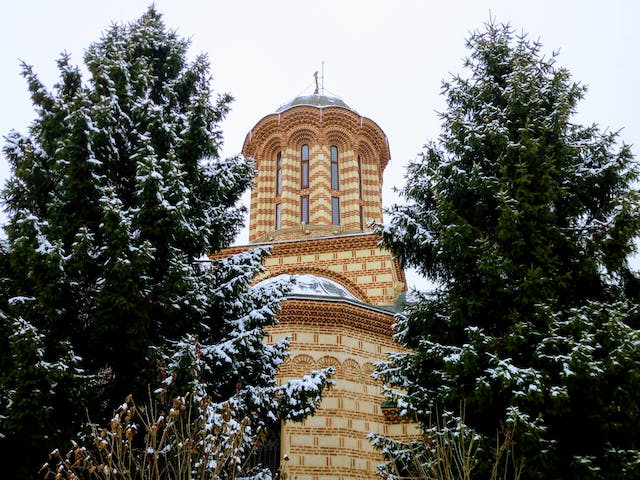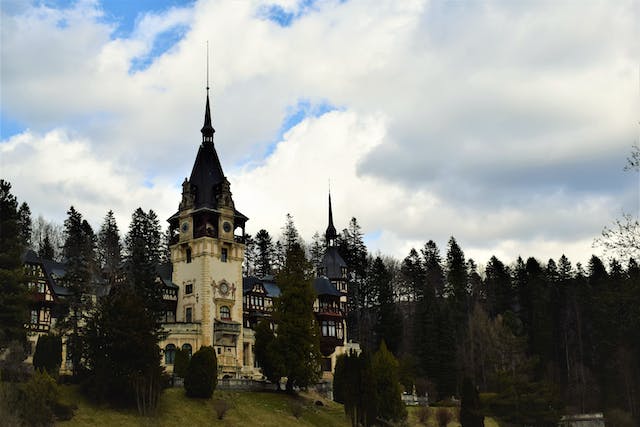Do’s and Don’ts of Romanian Culture
When embarking on learning a new language, it’s equally important to immerse oneself in the associated culture. Language is, after all, a gateway to understanding people and their customs. Today, we delve into the rich culture of Romania, a land that boasts a unique blend of historical influences and modern vitality. Whether you’re a language learner, a traveller, or simply a cultural enthusiast, grasping Romanian customs will greatly enhance your experience and interactions with Romanians.
In this article, we’ll explore some essential do’s and don’ts of Romanian culture that will help you navigate this beautiful country with respect and appreciation.
→Sign Up Now: Free Trial Romanian Lesson With a Native Teacher!←
Romanian Culture: The ‘Do’s’
1. Embrace the Generosity in Food and Drink
In Romania, the act of offering food and drink is not just a social obligation but a genuine display of hospitality and pride. Romanians are renowned for their generosity, especially when it comes to sharing their traditional cuisine. Whether you’re invited to a home or a local festivity, it’s customary to try the food and drink offered. This gesture is deeply appreciated and seen as an acknowledgment of their rich culinary heritage.
For instance, if you’re offered a plate of Sarmale (traditional cabbage rolls filled with minced meat and rice) or a glass of Țuică (a potent plum brandy), accepting it with gratitude is more than just good manners; it’s an entry into the heart of Romanian culture. Enjoying their food is akin to celebrating their identity, a gesture that fosters connection and respect.
2. Build Familiarity and Trust
In Romanian culture, establishing a personal relationship is key to meaningful interactions. Initially, Romanians might come across as reserved or formal, but this is a part of their cultural fabric. It’s important to invest time in building familiarity and trust. In professional settings or new acquaintances, expect a certain level of formality during initial interactions. However, once a personal connection is established, you’ll find a warm and welcoming spirit underneath.
This process of building relationships is fundamental in Romanian society. It’s not just about what you know or what you can do; it’s about who you are as a person. The transition from formality to a more personal and warm interaction is a sign that you’re being accepted and trusted.

3. Value Honesty and Directness
In Romanian culture, honesty is highly valued and is seen as a cornerstone of trust and respect. When asked for your opinion, it’s important to be truthful yet courteous. Romanians appreciate the frankness and often express their views and opinions directly. They are known for their forthrightness and for ‘telling it like it is’.
This cultural trait extends to addressing issues or mistakes. It’s customary to discuss such matters directly but in a polite and private manner. This approach to communication is not just about being straightforward; it reflects a deeper cultural emphasis on authenticity and integrity in relationships. Being open and honest in your interactions will earn you respect and trust in Romanian society.
Romanian Culture: The ‘Don’ts’
1. Approach the Topic of Communism with Sensitivity
Romania experienced a profound and transformative period under communist rule from 1947 until the revolution in 1989, a time marked by significant political and social changes. This era, under the leadership of figures like Nicolae Ceaușescu, is remembered for its authoritarian governance, economic struggles, and eventual dramatic overthrow, leaving a lasting and diverse impact on the Romanian psyche and society.
But, if you were thinking about making a speech on the evils of communism, think again. Romania’s history with communism is complex and often a topic of varied opinions. It’s important to avoid making strong statements or criticisms about this period. While discussions on the country’s communist past are not off-limits, they should be approached with sensitivity and a non-judgemental stance.
Let your Romanian counterparts lead such conversations and set the tone. Understanding and respecting their perspective is key to a respectful dialogue.
2. Be Mindful When Discussing Corruption
Corruption in Romania, a challenge that has been a significant concern, particularly in the post-communist era, has often been a focus in international discussions and media portrayals of the country. The issue predominantly stems from the transition period after the fall of communism, where rapid political and economic changes provided fertile ground for corrupt practices. In government and public administration, this has manifested in various forms, from bribery to misuse of public funds, often hindering the country’s progress and affecting public trust.
However, it’s important to note that Romania has been actively combating corruption, with considerable efforts to reform its legal and institutional frameworks. Initiatives such as strengthening anti-corruption bodies and increasing transparency in public procurement have shown Romania’s commitment to addressing these challenges.
So, while there is still a long way to go in the fight against corruption, as is the case in many countries, it’s advisable not to over-emphasize or stereotype Romania based on this aspect. Many Romanians are frustrated with how their country is portrayed in international media. Recognizing the strides Romania is making and its diverse, rich culture goes a long way in showing respect and understanding.
3. Distinguish Between Ethnic Romanians and Roma
In Romania, the ethnic Romanian majority and the Roma (or ‘Romi’) minority represent two distinct cultural and ethnic groups with different histories, traditions, and social experiences. The ethnic Romanians are the predominant ethnic group in Romania, primarily sharing a language and culture rooted in Latin origins, while the Roma, a traditionally nomadic ethnic group scattered across Europe, have a unique heritage and cultural practices that distinguish them from the ethnic Romanian majority.
Confusing these two can be offensive and demonstrates a lack of understanding of the country’s ethnic diversity. Being aware of this distinction is important for respectful and informed interactions within Romania.
Now that you know what you should or shouldn’t do when visiting Romania, let’s address some questions on Romanian culture frequently asked by our readers and students.
More Information on Romanian Culture: Our Community’s FAQs

1. What culture is similar to Romania?
Romania’s culture shares similarities with its Balkan neighbours, particularly Bulgaria, due to historical, linguistic, and ethnic ties. Both countries have a rich heritage influenced by a mix of Eastern European and Ottoman influences, reflected in their traditions, cuisine, and folklore. Additionally, Romania’s Latin roots bring it closer to other Latin-speaking countries, contributing to a unique cultural blend in Europe.
2. Is Romania a multicultural country?
Yes, Romania is a multicultural country. While the majority of the population is ethnic Romanian, the country is home to a variety of ethnic minorities including Hungarians, Roma, Ukrainians, and Germans. This diversity is reflected in its regional cultures, languages, and traditions. Romania’s history of being at the crossroads of Eastern and Western Europe has contributed to this rich cultural tapestry.
3. What is unique about Romania?
Romania’s uniqueness lies in its blend of Eastern and Western cultures, visible in its architecture, cuisine, and customs. It is home to picturesque landscapes, including the Carpathian Mountains and the Danube Delta. Romania also boasts a rich historical legacy, exemplified by medieval castles like Bran Castle, often associated with the Dracula legend, and the well-preserved traditions and folklore of regions like Transylvania and Maramureș.
4. Is Romania a ‘third world country’?
The term ‘third world country’ is outdated and often misused. It originally referred to countries not aligned with NATO or the Communist Bloc during the Cold War. Today, Romania is a member of the European Union and NATO, with a growing economy and developing infrastructure. So, no, Romania is not a ‘third world country’ but an evolving nation with a rich cultural heritage and increasing economic significance.
5. Is Romania a friendly country?
Romania is generally considered a friendly country, known for the hospitality and warmth of its people. Visitors often find Romanians to be welcoming and helpful, especially in rural areas where traditional values of community and hospitality are strongly preserved. The country’s diverse cultural heritage and scenic beauty further add to the welcoming atmosphere for tourists and expatriates alike.
6. What are Romanians proud of?
Romanians are proud of their rich cultural heritage, which includes a unique blend of traditions, folklore, and cuisine. They take pride in their history, especially their Latin roots which distinguish them in Eastern Europe. Romanians also cherish their natural landscapes, from the Carpathian Mountains to the Black Sea coast. Additionally, the achievements in arts, sports, and science contribute to national pride.
Why Learn Romanian with Language Trainers
Exploring the depths of Romanian culture reveals a world rich in history, tradition, and warmth, offering much more than what meets the eye. However, to truly embrace and understand the nuances of this unique culture, learning the Romanian language is key.
→Sign Up Now: Free Trial Romanian Lesson With a Native Teacher!←
At Language Trainers, we believe that language learning is not just about words and grammar; it’s a doorway to a new perspective on the world. Our native Romanian teachers are not only language experts but also cultural ambassadors who bring the essence of Romania into every lesson. They will guide you through the intricacies of the Romanian language, all while immersing you in the rich cultural heritage and unique customs that make Romania so special.
Our courses are tailored to fit your needs and learning style, whether you prefer the convenience of Romanian online classes or the personal touch of Romanian in-person lessons in London or wherever you happen to be located. What’s more, we cater to individuals seeking a personalised learning experience, as well as small groups that wish to embark on this cultural journey together. No matter your background or language proficiency, our classes are designed to be accessible and engaging for everyone.
So, whether you’re looking to connect with Romanian heritage, prepare for a trip, or simply expand your cultural horizons, Language Trainers is here to open the doors to a new and exciting world! Contact us now and get a free trial Romanian lesson!
